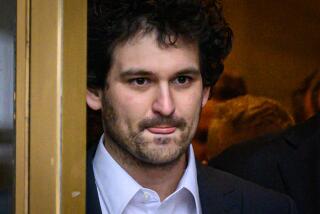B of A Makes Surprise Choice in Naming CEO : Banking: No. 2 executive is passed over for David A. Coulter, who becomes president now and gets chief executive title Jan. 1.
- Share via
BankAmerica Corp., in a surprise climax to a drawn-out process, Tuesday named Vice Chairman David A. Coulter to succeed Richard M. Rosenberg next year as chief executive of the nation’s second-largest banking company.
In selecting Coulter, 48, a corporate lending and investment banking expert, the board of San Francisco-based BofA passed over No. 2 executive Lewis W. Coleman, 53, who as vice chairman and chief financial officer has been the bank’s best-known voice on Wall Street.
Coulter, a 19-year BofA veteran, is not expected to dramatically change the bank’s corporate culture, which is regarded as effective but bureaucratic. “I don’t view him as the type of guy to turn the place upside-down,” said George M. Salem, bank analyst with Gerard Klauer Mattison in New York.
Despite the wave of mergers now sweeping the industry, few observers expect the banking giant to attempt any splashy deals soon, such as a rumored marriage with NationsBank, the acquisitive North Carolina bank that is just behind BofA in size.
Coulter most recently headed the company’s U.S. corporate and international groups, minding the bank’s dealings with its biggest corporate and government clients. Before that, he headed BofA’s investment banking operations.
His background contrasts with that of marketing whiz Rosenberg, who is most closely identified with BofA’s retail expansion.
Coulter is credited with overseeing BofA’s $2-billion acquisition last year of Chicago-based Continental Bank Corp., which corporate headhunter Tony Lord of Ward Howell International called “a textbook example of how to happily merge two companies.”
That acquisition made BofA the nation’s largest corporate lender. Coulter “has successfully guided our wholesale operations in gaining the top position in primary banking relationships,” Rosenberg said in a statement.
Coulter becomes president of BankAmerica immediately and will take on Rosenberg’s title of chief executive Jan. 1.
Rosenberg, 65, who has been chairman and chief executive since 1990, will remain chairman “into the second quarter of next year,” BofA said in a statement. Rosenberg announced last summer that he would resign as chief executive at the end of 1995.
Coulter said in a telephone interview that his proudest accomplishment at BofA is an organizational restructuring that allowed major corporate customers to deal with a single person at the bank, rather than a different officer for each product or service.
Coulter said that among the most important issues he faces in leading BofA is to make sure the bank capitalizes on its advantage as the only international financial organization headquartered on the West Coast. He expects BofA to emerge as a leading player in the fast-growing capital markets of Asia.
A fly fisherman and squash player outside of the office, Coulter described himself as a consensus-building manager on the inside. “I like to get a team of people together in a room, arguing about issues,” he said.
Coulter’s elevation took much of Wall Street by surprise. Coleman, a member of BofA’s board of directors, which Coulter is not, was widely thought to be the front-runner. Another leading candidate was believed to be Frank Newman, a former BofA vice chairman who recently announced his resignation as Deputy Treasury Secretary.
“I was shocked, no question,” said analyst Thomas K. Brown of Donaldson Lufkin & Jenrette. But Brown praised Coulter, saying that he expects BofA to become “less bureaucratic” under his guidance and noting that Coulter shares Coleman’s view that overpaying for growth is as bad as not growing at all.
Coleman has said several times this year that BofA is not interested in any large acquisitions as long as bank prices are so high.
“You’re not going to hear anything different from me than from Lew Coleman on that score,” Coulter said in the phone interview. “You can get a lot of earnings power out of this [existing] franchise,” he added.
Speculating as to why Coulter might have been chosen over Coleman, Brown said that Coleman’s blunt manner can sometimes offend colleagues. “Dave [Coulter] is more from the Dick Rosenberg school of being a little more politically correct.”
BofA said Coulter’s appointment culminates a more than year-long review of candidates by company directors led by Philip Hawley, chairman of the board’s executive personnel and compensation committee.
During Rosenberg’s tenure, BofA has nearly doubled in size to its current level of $226 billion in assets.
BofA shares have surged from $39.50 earlier this year as the stock market overall has risen, but at the recent peak price of $56.125 the shares were only marginally above their 1993 high price of $55.50. The stock added 37.5 cents to close at $54.625 on Tuesday on the New York Stock Exchange.
More to Read
Inside the business of entertainment
The Wide Shot brings you news, analysis and insights on everything from streaming wars to production — and what it all means for the future.
You may occasionally receive promotional content from the Los Angeles Times.










